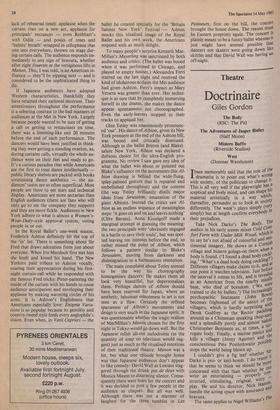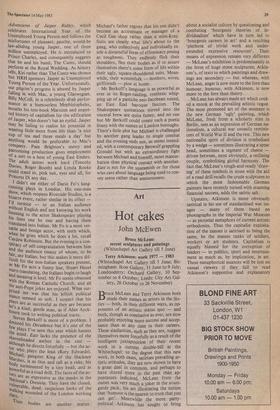Theatre
Doctrinaire
Giles Gordon
The Body (RSC: The Pit) The Adventures of Jasper Ridley (Half Moon) Mister° Buffo (Riverside Studios) West (Donmar Warehouse) Tbsen memorably said that the role of the dramatist is to point out what's wrong with society, of the politician to change it. This is all very well if the playwright has a sceptical and lively mind, and can shape his material artistically in a way which' thereafter, persuades us to look at society differently. The week's plays simplY (verY simply) but at length confirm everybody ill their prejudices. Take Nick Darke's The Body. The author in his early scenes mixes Cold Com- fort Farm with Under Milk Wood, which is to say he's not afraid of colourful and sen- timental imagery. He shows us a Cornish village and bizarre goings-on there when a body is found. CI found a dead body cockl- ing."What's a dead body doing cockline) Different villagers make claims to it, and at one point it watches television. Just before, the interval it comes to life, and is revealed as an American from the nearby base, who died of boredom. ('We were trained to die by bullets.') The increasinglY psychopathic lieutenant (John BOwe) becomes frightened of the antics ofth villagers, which is hardly surprising Wit11 Derek Godfrey as the Rector paddling around as a Chinaman speaking chop-sneY and a splendidly portly and almost naked Christopher Benjamin as, at times, a sur- rogate body. Finally, a marine panics arid kills a villager (Jenny Agutter) and the conscientious Pete Postlethwaite PossiblY stops the world being blown up.
I couldn't give a fig leaf whether Mr
Darke is pro- or anti-bomb. I do resent lie that he seems to think we should be mor concerned with that than whether he can write an entertaining — properly CO structed, stimulating, original, witty
play. He and his director, Nick and bravura.
bhraanydulerat.he acting space with assurance ail' , e
The same applies to Nigel Williams s
Adventures of Jasper Ridley, which celebrates International Year of the Unemployed Young Person and follows the misfortunes of pleasant, gauche, would-be law-abiding young Jasper, one of three million unemployed. He is introduced to Prince Charles, and consequently suggests that he and his band, The Cunts, should Perform at the Royal Wedding. As history tells, Kin i rather than The Cunts was chosen but HRH sponsors Jasper as Unemployed Young Person of the Year. Unfortunately, our pilgrim's progress is abused by Jasper falling in with Mac, a young Glaswegian. Billy McColl, in a relentlessly drab perfor- mance as a humourless Mephistopheles, mouths his text-book Marxism and unpot- ted history of capitalism for the edification of Jasper, who doesn't bat an eyelid. Jasper may be failing to realise his potential in wanting little more from life than 'a nice Cup of tea and three meals a day' but anything would be preferable to Mac's company. Pam Brighton's messy and Patronising production gives employment of a sort to a host of young East Enders. The adult actors work hard (Timothy Davies, Roger Booth) and Lynda Rooke could stand in, pink suit, eyes and all, for Princess Di any day. 1 didn't see either of Dario Fo's long- running plays in London. His one-man Show, which reopens Riverside Studios, is a bizarre event, rather similar in its effect — I'd surmise — to an Italian audience without English and not knowing his work listening to the actor Shakespeare playing his lines one by one and having them translated into Italian. Mr Fo is a most ver- satile and benign actor, with teeth which, When he grins which he does a lot, recall Cardew Robinson. But the evening is a con- spiracy of self-congratulation between him and the audience (many of whom, to be fait, are Italian, but this makes it more dif- ficult for the non-Italian speakers present, aS Mr Fo acts a funny line, Stuart Hood starts translating, the Italians begin to laugh and meaning is lost), Mr Fo seems obsessed With the Roman Catholic Church, and all the anti-Pope jokes are enjoyed. What sur- prised me was that his leftish political stance seemed so soft. I suspect that his Plays are as successful as they are because he's a kind, gentle man, as if Alan Ayck- °ourn took to writing political tracts. Steven Berkoff is more of a problem. I detested his Decadence but it's one of the few Plays I've seen this year which haunts Lae mind. East lacks the presence of the shavenheaded author in the cast — although he directs forcefully — but the ac- tor, Who plays the lead (Rory Edwards), Michael, gangster King of the Hackney .marshes, is as thin and tall as a rake, his body surmounted by a tiny head, and as Powerful as a road drill. The faces of the ac- tors. are as expressive as the masks in the Oresteia. They have the closed, tilaerable, dead, suspicious looks of the walking wounded of the London working class.
Their bodies are another matter.
Michael's father regrets that his son didn't become an accountant or manager of a Cecil Gee shop rather than a mini-Kray. Suits are clearly what life's about to the gang, who collectively and individually ex- ude a distasteful form of effeminacy posing as toughness. They endlessly flick their shoulders, flex their bodies as if to assure themselves there's some form of life within their ugly, square-shouldered suits. Mean- while, their womenfolk — mothers, wives, girlfriends — pine at home.
Mr Berkoff's language is as powerful as ever in its Roget-raiding, synthetic whip- ping up of a pastiche neo-Jacobean sound, an East End baroque fascism. The Shakespeare quotations stirred into the visceral brew are quite funny, and no one but Mr Berkoff could create such a poetic litany with the names of London boroughs. There's little plot but Michael is challenged by another gang leader to single combat and the evening ends not, as seems intend- ed, with a contemporary Beowulf grappling Grendel but with an extraordinary fight between Michael and himself, more mastur- bation than physical contact with another. East is not for the squeamish or for those who care about language being used to con- vey sense rather than sensuousness.











































 Previous page
Previous page